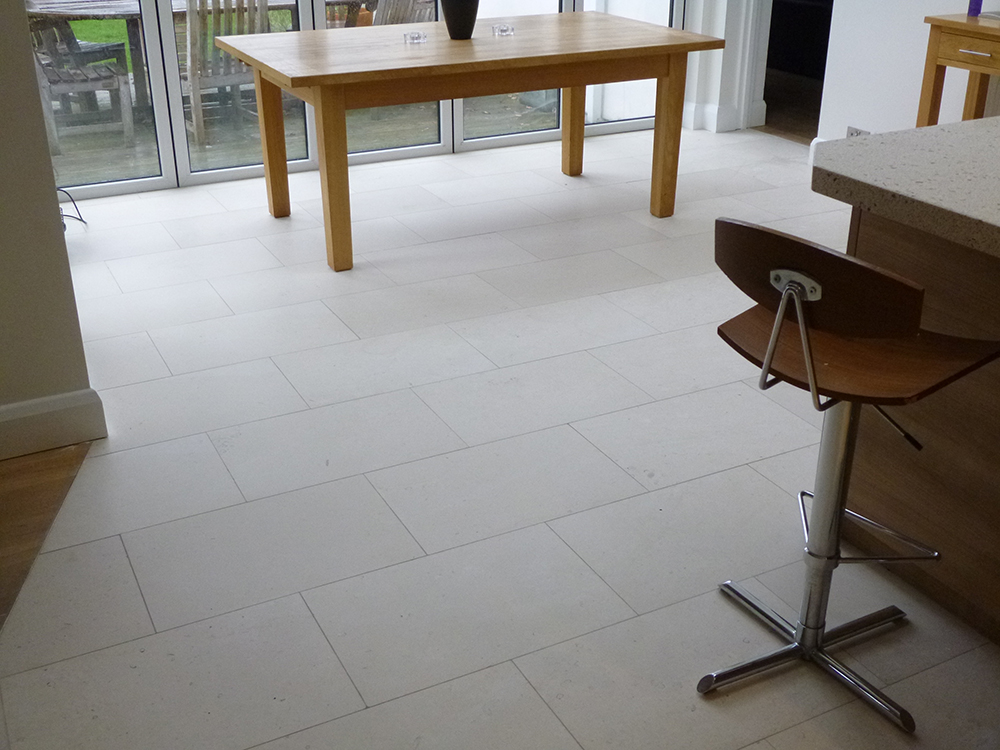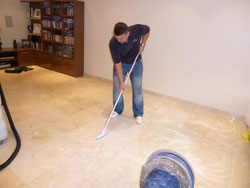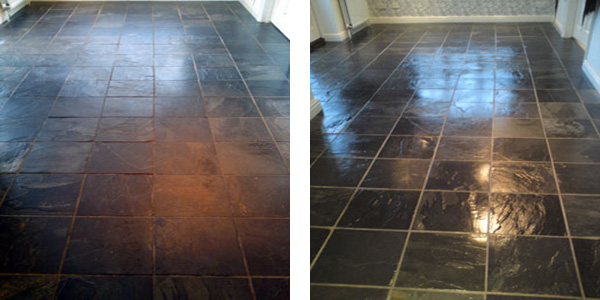
Porcelain The Ultimate Ceramic Tile
Porcelain tile is a tile that is generally made by the dust pressed method from Kaolin clays which result in a tile that is dense, impervious, fine grained and smooth, with a sharply formed face.
Porcelain tiles usually have a much lower water absorption rate (less than 0.5%) than non-porcelain tiles making them frost resistant or frost-proof.
Porcelain tiles are much harder 6 – 8 on the MOHS scale of hardness which accounts for them being much more wear and damage resistant than non-porcelain ceramic tiles, thus making them suitable for any application from light traffic to the heaviest residential and light commercial traffic.
Full body porcelain tiles carry the colour and pattern through the entire thickness of the tile making them virtually impervious to wear and are suitable for any application from residential to the highest traffic commercial or industrial applications.
Porcelain tiles are available in matte, un-glazed or a highly polished finish.
“Mark was the perfect tradesman; turned up on time, protected adjacent surfaces where required, got on with the job without any fuss, asked for our preferences where appropriate, did a good job and cleared up after. Very pleased with the final result.”
Not all porcelain is equal…
For the consumer caution should be noted especially with many Porcelain tiles coming from all over the world especially Asia, where as the original Italian Porcelain set the standards in quality of Clays used and firing technology including quality control. This resulted in a Porcelain that was very expensive.
Other manufacturers attempts to produce cheaper Porcelain products to meet varying different markets has resulted in some cases a poorer quality material that has problems due to flaws in the tile for example the original European standard UNE EN ISO10. 545-3 sets water absorption at less than 0.5% in addition dimensional tolerances should be very stringent; any deviation from meeting the standards set will result in a tile that will be more susceptible to staining scratching as well as cracks that can not be seen by the eye.
In general problems of maintenance for polished tiles are exposed pores, cracks, scratches etc where as problems for unpolished are mostly surface texture trapping dirt Cleaning and maintenance regime is necessary and neutral ph cleaners used scrub brush and pads, and residues removed.
Sealing is sometimes necessary on some polished Porcelain depending upon absorption a test should always be carried out after fixing or cleaning. For other unpolished Porcelain generally it will not be recommended for reasons of non penetration.
Terracotta – Cotto. Saltilo Mexican
A Terracotta floor can be a perfect partner for an older style property and is still seen in many country homes there are many rich colour variations even black, so there are many varieties to choose from and are supplied from many parts of the world. Popular choices are Spanish or Mexican Saltillo and closer to home in the UK.
Terracotta are the earliest form of clay tiles many where hand made using local clay poured into moulds and hand stamped allowed to dry out and oven fired at 800c or less, although mostly machine made there are still some traditionally made in this way.
It is said that when many tiles are wearing out terracotta will just be wearing in; earliest use of Terracotta dates back thousands of years.
In Mesopotamia 2800BC Terracotta was used as a building material for defensive city walls, flooring and wall art.
Some older stately homes, monasteries, church floors or wall tiles are proof of the longevity of this popular material.
Terracotta tiles generally can be extremely porous and should always be sealed.
Our services for terracotta tile cleaning include;
“Mark is extremely professional and polite and his decades of experience shine through very clearly when he talks about tile restoration. Mark managed to restore marble tiles in my bathroom and polish them up like new. He also has high end equipment worth thousands of pounds to clean almost any flooring or fabric. I would use Mark again and recommend him to others without hesitation.”
Customer in CM15
Ceramic
 Ceramic tiles have been made by man for over 4000 years some of the earliest being found in Egyption pyramids, in the ruins of the Babylonian empire through to the Greek empire up to the present day, many early tiles were beautifully decorated and hand painted.
Ceramic tiles have been made by man for over 4000 years some of the earliest being found in Egyption pyramids, in the ruins of the Babylonian empire through to the Greek empire up to the present day, many early tiles were beautifully decorated and hand painted.
“Ceramic” or non-porcelain tiles are generally made from red or white clay body (bisque) fired in a kiln at 980c. They are almost always finished with a durable impervious glaze which carries the colour and pattern. These tiles are used in both wall tile and floor tile applications, are softer and easier to cut than porcelain, Non-porcelain ceramic tiles are usually suitable for very light to moderate traffic, Ceramic is less frost resistant and more prone to wear and chipping than porcelain tiles.
Cleaning and maintenance of ceramic tiles is generally easy although some textured or uneven surfaces do trap soil and the The grout often being a cementous course or fine grout often becomes easily soiled and stained and will need deeper cleaning, it is possible to re-colour the grout For a new like finish.
Our services for ceramic tile cleaning include;
Marble
Marble is a beautiful natural stone and rightly called the queen of stone for its diverse colour range, its structural composition made mostly of calcium and mineral deposits that produce its characteristic veining.
Marble is classed as a metamorphic stone (Greek for change form) being the result of transformation of a pre-existing rock namely Limestone, mineralogy Calcite, Dolomite or Serpentine, ranging in colour from white, grey, red, pink, buff, rose, gold, green, yellow, black, brown and tan. Marble although not as porous as some Limestones it is a relatively soft material measuring 3 – 5 on the MOHS scale of hardness.
Marble will without question require sealing and a regular cleaning & maintenance regime.
It is vital that you use the right cleaning products regularly. This is particularly important because these calcite stones are very acid sensitive – acid etching is one of the most common damage that we are called upon to restore. To reduce the frequency between the restoration process it is vital you follow some basic advice.
“Mark did an excellent job, he is very personable, and took great care of our property and worked hard to produce excellent results.”
Granite
Granite is classed as an igneous stone formed above and below the Earths surface. These stones are commonly believed to have solidified from molten rock called magma under extreme pressure.trapped in small pockets these eventually cool and the magma becomes dense igneous rock, above the surface the magma is known as lava these cool much faster forming a different variety of igneous rock or lava rock Basalt.
Granite has become extremely popular in recent years for flooring and predominantly worktops, splash backs, wall tiles and external buildings.
Generally Granite is a good choice for choice for its relative ease of maintenance, with good chemical resistance, acid and alkali Granite is of high density, 6 -7 on the MOHS scale of hardness and is therefore fairly hard wearing and relatively stain proof, due to it’s low porosity some granite should be sealed I have seen a very porous granite darken with just water applied that has penetrated.
Buyers beware though that not all Granites are true Granites, (although a geologist would possible disagree); some are basalt being labelled granite by suppliers especially some of the blacks coming out of Asia some are even dyed, these basalts are susceptible to staining and even acid etching because they may contain small fragments of impurities Calcite probably picked up on the surface.

Our services for Granite cleaning include;
Restoration is almost not economical to undertake and can be extremely difficult, so please check with your supplier first.
Given all the above, as with all materials, damage can occur such as chips or scratches or just general wear and tear. Incorrect sealers applied or poor cleaning products can cause dulling.
Limestone
Limestone is classed as a Sedimentary rock (meaning in Latin settling of layers) created from a blend of organic materials, mostly Calcite 50% 97% Dolomite often recognised by the skeletal remains of minerals small ancient creatures from sea beds ordinarily white although may contain colours from impurities, Iron oxide adding a brown red or yellow colour, carbon giving a blue grey , even black pigment other colours include white, grey, rose, rust, tan, blue, ivory, buff.
Not all Limestone is as you would expect. Other Limestones are almost transformed (Metamorphic) into marble and crystalised due to the intense heat and compact pressure. These are harder and will take a higher shine such as Crema marfa; in these Limestones many of the fossilised creatures willhave been burnt out.
Limestone flooring, wall tiles and counter tops come in many variations from a textured rustic sand blasted, hammered , flamed- honed -tumbled creating an old world worn look or rarely polished.
Whichever finish you choose it is worth remembering that Limestone is generally high maintenance.
Limestone is much more porous than many other stones and being a relatively less dense stone with high calcite content, it would be more advisable to install the stone in areas of less high foot traffic.

Resulting foot traffic will cause scratching and damage from wear and tear, and etching from acid containing drink spills or favourite food additives. It is essential that it is properly sealed to retard soiling/staining as much is possible.
Correct cleaning and maintenance should be introduced to prolong the time before restoration.
Regular Maintenance
Our first recommendation is to provide very good barrier matting at entrances, especially to external doorways halls etc. This will help trap the very destructive particles of grit and sand that will scratch and wear the surface. Although many stones are honed (matt appearance) and generally do not show up scratches as much as a polished stone, embedded soil and staining penetrating into the stone surface will quickly make it look unsightly.
It is always useful to keep indoor slippers near the entrance hall.
Regular dry mopping with a microfibre pad or alternatively vacuum loose particles with a cylinder-type vacuum that has a soft brush head, then use a good stone soap for damp mopping.
Don’t use high alkaline or especially acid based cleaners, always attend to spills straight away, mopping up with clean water.
Be Warned...
NO SEALER WILL WITHSTAND ACID COMPLETELY

This is very important with acid based foods or drinks, even these deposits, if left for a short period will cause etching of your Limestone needing restoration.
Stone Floor Restoration
As with all stone when cleaning scrubbing and polishing fails restoration will be required. This uses specialist Diamond abrasives equipment & tools to re-surface and refinish your stone tiles.
Our services for restoration include:
Sandstone
Sandstone is an sedimentary rock composed mainly of feldspar and quartz Iron oxides silica sand matrix with quartz and varies in colour (in a similar way to sand), through grey, yellow, red, and white. beige, brown, tan, buff, ivory, pink, purple, yellow, gold, rust, cream.
Sandstones are often relatively soft and easy to work which therefore make them a common building and paving material walls, cladding, beams and sills.
Caution however using sandstone in a kitchen or internally is not a good idea, and in our opinion is best used externally.
Although Sandstone is harder and more durable than marble or Limestone it is a porous material and soils and stains easily, however it is relatively chemical resistant, although there are some sandstones that contain acid sensitive mineral components.
We recommend sealing sandstone very well and the amount of sealer applications depends upon porosity and sealer chosen. In addition a colour enhancer will bring out the natural patina of this stone if desired as below.
Our services for Sandstone include:
Slate
Slate is a sedimentary rock composed of clay or volcanic ash that has metamorphosed through high heat and pressure containing quartz, Mica, shale.
At one time colours were limited to blacks, greys, greens – now there are vast arrays of colours; India produces 45 colours, China 40 colours Brazil 10 colours.
Some slate tiles are harder and denser, resisting scratching wear and tear; others others can scratch very easily and correct advice as to the appropriate areas for installation would be advised.
Slate can be smooth or textured riven with flaky parallel layers of mica or shale. Slate has for centuries been useful as a roofing material particularly the welsh slate in the UK.

As a roofing material, slate has lasted hundreds of years compared to cheaper synthetic roofing materials. It has been used for building cladding, fire surrounds, & flooring flags in many older buildings.
Although not as porous as some stones we always recommend proper stone sealing to resist soiling and staining.
Terrazzo
Travertine
Terrazzo was first used as a flooring material in 16th Century in Italy and has been used extensively since because of its high wear abilities.
Terrazzo – a type of coloured matrix of sand cement resin in which chips or pieces of agregate, usually marble, are mixed and are ground to a flat surface and finely polished exposing the chips, which take a high polish.
Terrazzo comes in many colours and no floor is exactly the same. It is extremely hard wearing and will last a lifetime which is why it is traditionally seen in commercial environments more than domestic homes, and is expensive to install and finish.
After installation and polishing Terrazzo tiles it is strongly recommended that it is properly sealed to protect the flooring from any staining that can penetrate very deep into the surface, making removal difficult if not impossible. Generally maintenance is relatively easy with the right cleaning materials.
“To say I am happy with Mark at Stonecare’s specialist treatment of the floor on my new home is an understatement to say the least. When you work with truly professional skilled tradesmen like Mark it makes you feel good because there are a lot of chancers out there and stone floors can be ruined very easy with the wrong care. Mark is a true professional and I will be recommending without hesitation. My floors look better than brand new. Thanks again Mark”
Travertine is classed a sedimentary stone a variety of Limestone/ Marble mostly of Calcite Dolomite, originating from hot springs depositing Calcium in layers, the flowing waters and gas bubbles result in the holes typically seen in Travertine.
These holes are often filled with cement or resins during the fabrication process or during installation and can be seen in your tiled floors or walls, decorative table tops etc. The holes are more prevalent in cross cut as opposed to vein cut which you may want to consider before purchase.
It can be surprising that Travertine tiles can range in other colours than the more widely available tan, browns that are seen in most retailers, they can range from Ivory, rose, pink, greys, yellow, silver.
Travertine is often honed, meaning a mat, smooth unpolished or lightly polished finish. This usually looks slightly pale in appearance and can enhance the colour of the stone with colour enhancing primers bringing out the natural patina.
On the MOHS Hardness scale Travertine is rated 3 therefore is relatively soft and will have the same wear and scratch problems that Limestone and Marble has.
The stone is widely used today because of its wide range of finishes from bathroom sinks, wall tiles mosaics in shower rooms or around kitchen worktops as colourful and warmth adds to its aesthetics.
Travertine is also widely available at very good prices, due to supply from DIY stores making it much more affordable than more expensive Marbles or Limestones.

